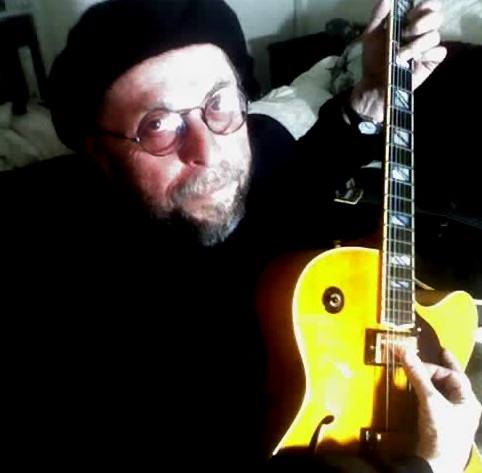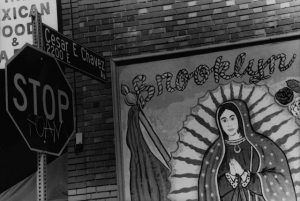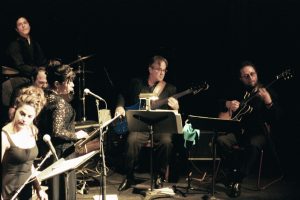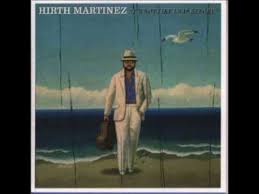
You may feel destined to meet some people. Others you pursue methodically because you’re looking for them. I met my companion on the road of life that way. I’d heard about her and her theater company. I went to see them. She and the theater knocked me out. I joined. We worked together. We merged, clashed, bonded, fell in love, and stayed that way. On purpose.
My friend Hirth died five years ago, today. I don't think he'll mind if I bring that up. Whatever I did, he was down with it; whatever he did, I was down with him.
I met my second mentor — in sequence, not by degree of influence —at the “Los Angeles Times Festival of Books” when he sat on a literary panel with a couple of other authors. Novelist and essayist John Rechy sat on the dais behind the table in dyed orange hair and a muscle shirt. He was funny, honest, as hard-edged and as articulate as his torso. Oh, and I’d read his iconic novel, City of Night, back when it occupied everyone’s brick-and-board bookshelves. When I heard he ran a workshop, I ran after it, jumped aboard, and studied with him for seven years.
Other people you meet because you’re on the scene, and the scene happens to be larger and more inclusive than your experience allowed for. These people seem to appear by happenstance, but you really met them because you musta been in the right place and it musta been the right time. Sure, Dr John’s similar tune “Right Place, Wrong Time,” is full of confounded gris gris and grief, conflict and fatalism, but, if anybody has the aché to put me in the right place at the right time, it’s Dr. John, the Night Tripper. And I bring Dr. John into the conversation, because the man I met in the winter of 1989 just happened to be the Dr. John of the guitar, the prince of Boyle Heights.
Our theater company was performing a show with music called “Scenes from the Abortion Wars” at a big benefit for the Feminist Majority when they were lobbying Congress to approve the first morning-after pill, called mifepristone, or RU-486. The Germans had first developed this wonder drug and now it’s on the World Health Organization’s List of Essential Medicines. RU-486 had a pretty exciting launch. The Germans ran afoul of European pro-lifers and passed the drug off to the bon vivant French who saw its value. Of course, there’s nothing bon vivant about being involuntarily pregnant, and American anti-abortionists were hell-bent to stop its manufacture and sale here in the land of the free. The Abortion Wars had been joined and the Feminist Majority stood on the front lines.
We had just set up in the theater, done a sound check, and I had cadged a tunafish hero off the craft table. I was looking for a place to get off my feet and scarf the sandwich before showtime. Two tables over, a guy was sitting with a big Gibson hollow-body on his lap, noodling. He was dressed in a light blue gabardine suit, comfortable shoes, and a matching, light-blue pork pie hat, turned up at the front. Up closer, I picked up on a thin beard and wire-rimmed spectacles on slightly bulging eyes. As a guitar player, even his warm-up noodling sounded fast, lyrical, and tight. It was love at first sight.
I struck up a conversation. He was part of the event lineup. He had been asked to play a few tunes before the show, and now he was warming up with a light jazzy feel to his left hand, finger picking not country, more r&b, more New Orleans. There he was, Hirth from Earth Martinez, the Dr. John of the guitar. He had a warm, raspy voice, not from smoking, just from who he was. We talked briefly about the guitar, how it had been stolen out of his car when he was unloading equipment at night in the alley behind his Boyle Heights pad. But the knucklehead who stole the Gibson tried to pawn it in a local shop and everybody knew Hirth’s guitar so, it was back in his lap before he could ask around.
 Hirth understated this twist of fortune with a shrug, as if to say there are no coincidences. Hirth had been well-connected in the neighborhood since birth. He personified Boyle Heights, an embattled but sequestered LA ‘hood, half Jewish (since the early 1900s) and half-Chicano (since the 1950s and ‘60s). Hirth’s old man was a Chicano labor organizer. His Jewish mother was a teacher. Brooklyn Avenue became Cesar Chavez Boulevard, but the neighborhood stuck together to overcome differences and keep out the developers and fast food chains. Through it all — with a few ragged exceptions — everybody got along just fine.
Hirth understated this twist of fortune with a shrug, as if to say there are no coincidences. Hirth had been well-connected in the neighborhood since birth. He personified Boyle Heights, an embattled but sequestered LA ‘hood, half Jewish (since the early 1900s) and half-Chicano (since the 1950s and ‘60s). Hirth’s old man was a Chicano labor organizer. His Jewish mother was a teacher. Brooklyn Avenue became Cesar Chavez Boulevard, but the neighborhood stuck together to overcome differences and keep out the developers and fast food chains. Through it all — with a few ragged exceptions — everybody got along just fine.
Hirth and I swapped numbers at the outdoor tables that day and soon after, I got a chance to work with him. We had started a cabaret downtown in an experimental black box attached to the Los Angeles Theater Center. The cabaret featured performers on the scene back then, vaudeville nouveau performance artists, egotistical mansplaining singer songwriters, people from the Theater Center labs, avant garde loonies, comediennes. It was my job to glue the chaotic polyglot together with a band.
 It’s hard to find good theater musicians. They have to be versatile — play in a bunch of styles, be willing to start and stop in rehearsals. Music has straightforward organizers — chords, tempo, structure. Just point three fingers down, say 16-bar, half-time, funky, and the rhythm section can vamp in E-flat from here to eternity. We needed musicians who could play any tune in any key, but also, they had to put up with actors. Musicians are used to walking into a gig, setting up, playing, breaking down, getting paid, and leaving. Actors and the theater take a more serpentine route to performance. I won’t belabor the point.
It’s hard to find good theater musicians. They have to be versatile — play in a bunch of styles, be willing to start and stop in rehearsals. Music has straightforward organizers — chords, tempo, structure. Just point three fingers down, say 16-bar, half-time, funky, and the rhythm section can vamp in E-flat from here to eternity. We needed musicians who could play any tune in any key, but also, they had to put up with actors. Musicians are used to walking into a gig, setting up, playing, breaking down, getting paid, and leaving. Actors and the theater take a more serpentine route to performance. I won’t belabor the point.
Hirth loved it all. His patience with rehearsals was terrific, no actor weirdness phased him, and he had a great sense of humor. I loved playing music with Hirth. He made anything rock, or swing, depending. He’d try playing anything with notes and invariably pulled it off. We also began playing commercial gigs together — hotels, little clubs. We played a steady gig on Sunday afternoons at the Farmers Market, and we began hanging out week days in Boyle Heights.
 Travelling through Boyle Heights with Hirth was like going home. Every restaurant we settled into, he knew the whole family who fed us their favorite dishes. Every music store we walked into, Hirth knew the musical history of all the store guys, and boy did they know him. Everybody loved this quiet, laid back hipster who sang in a hip sotto voce, breathy but right in tune. His original tunes were whimsical, inside jobs, full of wit, longing, and self-deprecating reflection. Think Bob Dorough, Mose Allison, Dave Frishberg, beatific wise guys who had followed the music forever, wherever it took them. Hirth could get away with a beret, a stevedore’s cap, a fedora, or a stingy brim; he always had a lid on. And if he used hip language you knew he was putting you on.
Travelling through Boyle Heights with Hirth was like going home. Every restaurant we settled into, he knew the whole family who fed us their favorite dishes. Every music store we walked into, Hirth knew the musical history of all the store guys, and boy did they know him. Everybody loved this quiet, laid back hipster who sang in a hip sotto voce, breathy but right in tune. His original tunes were whimsical, inside jobs, full of wit, longing, and self-deprecating reflection. Think Bob Dorough, Mose Allison, Dave Frishberg, beatific wise guys who had followed the music forever, wherever it took them. Hirth could get away with a beret, a stevedore’s cap, a fedora, or a stingy brim; he always had a lid on. And if he used hip language you knew he was putting you on.
Hirth started playing in Mariachi bands in the neighborhood when he was 14. At Hollywood High, he attended under a performer’s certificate, which allowed him to take off from school for gigs. And such gigs — he played in salsa joints and on recording gigs. He wrote tunes for other artists and recorded his own music when he could. We were locked in, sympatico. Whatever I did, he was down with it; whatever he did, I was down with him.
Hirth died a five years ago. His departure left a big, sad permanent hole in the sole of my scuffed-up soul/ a big, sad permanent hole in the sole of my scuffed-up soul.
# # #
Writer, editor, and educator based in Los Angeles. He's also played a lot of music. Degelman teaches writing at California State University, Los Angeles.
Degelman lives in the hills of Hollywood with his companion on the road of life, four cats, assorted dogs, and a coterie of communard brothers and sisters.



Hirth sounds like a great guy to hang with, Charlie. Full of life and fun, unfazed and ever-patient. I can see why you fell for him at first chord. You’ve written a loving tribute.
Thanks, Betsy. I’m glad I was able to get those qualities across! His long-time companion keeps his FB page eerily alive. She’s quite good at it, partially because of her own awareness, but also because Hirth has one of those spirits that likes to just fall by to say ‘hi’ now and then!
I love this story for so many reasons! Memories of Dr. John the Night Tripper, who just died this summer (sniff). Using terms like gris gris and aché easily in a sentence. Playing a fundraiser for the Feminist Majority and RU-486. Your wonderful description of Hirth, enabling us to get to know this unforgettable character. And finally, the picture of the two of you playing together. (Note to other readers: you can click on the pic to make it big.)
Thank you, Suzy! I did cover the territory in this portrait, I do confess. I think many of us are at a stage in life when there’s always more to tell. Damn the editors, full speed ahead!
This was a beautiful tribute to Hirth and the music scene. It’s sad when our mentors die, but you keep his memory alive with your writing.
Thanks, Laurie. Hirth was a pal more than a mentor, but like most ‘quality’ pals, we learned a great deal from each other.
Charles, as always it’s fascinating and fun to read about your life’s journey and the people you’ve met on the way who’ve became soulmates.
So sorry for your loss!
Thanks, Dana. And what a long, strange trip it’s been, altho, nothing like what we’ve all been through in the past four years!
Ah could must mean our national nightmare? May it end Nov 3.
This story hit so many perfect chords (play on words semi-intended) but, of course, you are a marvelous writer, Charles. And with Hirth, you had a perfect subject. Through your magical description, I feel I somehow know a truly enigmatic person. But, no less important the richness of the story was your splendid evocation of the environment — physical, political, artistic — in which all this swirled around.
In a story this amazingly well crafted, it is tough to pick a favorite line. But I will go with: “He had a warm, raspy voice, not from smoking, just from who he was.”
Thanks, John, for your kind and thoughtful words. I did feel as if this one wrote itself, with Hirth’s warm, raspy voice talking to me. And didn’t we laugh! Still missing Hirth.
This is a stunning piece of what people used to call the “New Journalism” because it intertwines the author’s own biography and sensibilities and reactions with on-the-ground factual and descriptive reportage. It brought to mind, for the first time in many years, the work of Norman Mailer in books like “Miami and the Siege of Chicago.” (I hope you take that as a compliment; it’s meant to be). I also want to give props for turning a prompt about “death” into a celebration of one man’s life and impact, with just a marginal note about his passing. Authors on this site continue to show me how creatively we can use the prompts and I appreciate it.
There is so much more to laud in the crafting of this piece, but I will note two elements I really admired: (a) the way that you used very short sentences to balance and contrast to longer ones, creating a kind of music as you are writing a piece about music. A good example is in the very first paragraph, “I joined. We worked together. We merged, clashed, bonded, fell in love, and stayed that way. On purpose.” (b) Just as you had short and long sentences playing off one another, you also had somewhat high-falutin or lofty or frolicsome language juxtaposed against starker or cruder word choices. There are many but one example would the words “bon vivant” juxtaposed with “involuntarily pregnant.” Kind of a show-stopper when you put those together.
Thanks, Dale, for your thoughtful and articulate response. As is so often the case, I didn’t set out to write new journalism, but I appreciate your observation. The genre seems to lend itself to Retro pretty naturally. As regards your observations about music, I feel as if my meandering from writing to acting to music to writing has given me a big pond to pull from. Music does lend tempo without thinkin’ about it, acting and the theater goes to scene work — how the hell do you write dialog without first having to memorize it, for better or for worse? Maybe the juxtaposition of language comes from the foolishness of having lived through so many eras and environments. Thanks again for your time and attention. I will try to return in kind.